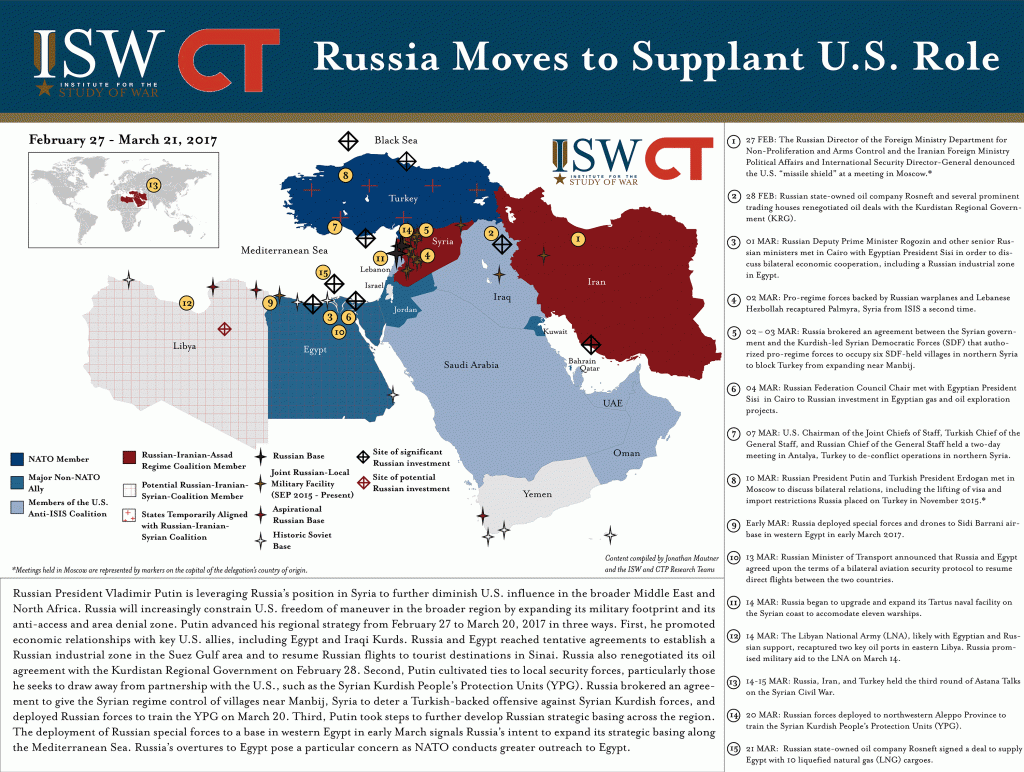{{currentView.title}}
March 22, 2017
Russia Moves to Supplant U.S. Role
Russian President Vladimir Putin is leveraging Russia’s position in Syria to further diminish U.S. influence in the broader Middle East and North Africa. Russia will increasingly constrain U.S. freedom of maneuver in the broader region by expanding its military footprint and its anti-access and area denial zone. Putin advanced his regional strategy from February 27 to March 20, 2017 in three ways. First, he promoted economic relationships with key U.S. allies, including Egypt and Iraqi Kurds. Russia and Egypt reached tentative agreements to establish a Russian industrial zone in the Suez Gulf area and to resume Russian flights to tourist destinations in Sinai. Russia also renegotiated its oil agreement with the Kurdistan Regional Government on February 28. Second, Putin cultivated ties to local security forces, particularly those he seeks to draw away from partnership with the U.S., such as the Syrian Kurdish People’s Protection Units (YPG). Russia brokered an agreement to give the Syrian regime control of villages near Manbij, Syria to deter a Turkish-backed offensive against Syrian Kurdish forces, and deployed Russian forces to train the YPG on March 20. Third, Putin took steps to further develop Russian strategic basing across the region. The deployment of Russian special forces to a base in western Egypt in early March signal Russia’s intent to expand its strategic basing along the Mediterranean Sea. Russia’s overtures to Egypt pose a particular concern as NATO conducts greater outreach to Egypt.
Captions:
27 FEB: The Russian Director of the Foreign Ministry Department for Non-Proliferation and Arms Control and the Iranian Foreign Ministry Political Affairs and International Security Director-General denounced the U.S. “missile shield” at a meeting in Moscow.*
28 FEB: Russian state-owned oil company Rosneft and several prominent trading houses renegotiated oil deals with the Kurdistan Regional Government (KRG).
01 MAR: Russian Deputy Prime Minister Rogozin and other senior Russian ministers met in Cairo with Egyptian President Sisi in order to discuss bilateral economic cooperation, including a Russian industrial zone in Egypt.
02 MAR: Pro-regime forces backed by Russian warplanes and Lebanese Hezbollah recaptured Palmyra, Syria from ISIS a second time.
02 – 03 MAR: Russia brokered an agreement between the Syrian government and the Kurdish-led Syrian Democratic Forces (SDF) that authorized pro-regime forces to occupy six SDF-held villages in northern Syria to block Turkey from expanding near Manbij.
04 MAR: Russian Federation Council Chair met with Egyptian President Sisi in Cairo to Russian investment in Egyptian gas and oil exploration projects.
07 MAR: U.S. Chairman of the Joint Chiefs of Staff, Turkish Chief of the General Staff, and Russian Chief of the General Staff held a two-day meeting in Antalya, Turkey to de-conflict operations in northern Syria.
10 MAR: Russian President Putin and Turkish President Erdogan met in Moscow to discuss bilateral relations, including the lifting of visa and import restrictions Russia placed on Turkey in November 2015.*
Early MAR: Russia deployed special forces and drones to Sidi Barrani airbase in western Egypt in early March 2017.
13 MAR: Russian Minister of Transport announced that Russia and Egypt agreed upon the terms of a bilateral aviation security protocol to resume direct flights between the two countries.
14 MAR: Russia began to upgrade and expand its Tartus naval facility on the Syrian coast to accomodate eleven warships.
14 MAR: The Libyan National Army (LNA), likely with Egyptian and Russian support, recaptured two key oil ports in eastern Libya. Russia promised military aid to the LNA on March 14.
14-15 MAR: Russia, Iran, and Turkey held the third round of Astana Talks on the Syrian Civil War.
20 MAR: Russian forces deployed to northwestern Aleppo Province to train the Syrian Kurdish People’s Protection Units (YPG).
21 MAR: Russian state-owned oil company Rosneft signed a deal to supply Egypt with 10 liquefied natural gas (LNG) cargoes.
The Institute for the Study of War (ISW) produced this map with the Critical Threats Project (CTP). The graphic is part of an intensive multi-month exercise to frame, design, and evaluate potential courses of action that the United States could pursue to destroy the Islamic State in Iraq and al Sham (ISIS) and al Qaeda in Syria. The ISW-CTP team recently released “America’s Way Ahead in Syria,” which details the flaws in the current U.S. approach in Iraq and Syria and proposes the first phase of a strategic reset in the Middle East.

